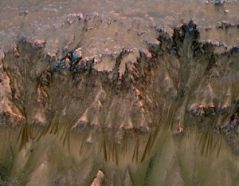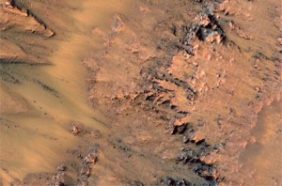Possible new saltwater stains on Mars
Dark streaks that grow in spring, fade in winter may point to saltwater on the Red Planet

Here on Earth, it’s easy to find saltwater: Just head to the nearest sea. Oceans cover most of Earth’s surface, which means if you were to transport yourself to a random spot on our planet, you would probably end up all wet.
The same isn’t true on Mars: Though ice has been found there, and scientists suspect water flowed on Mars a long time ago, they argue about whether water still moves on the Red Planet. In a new study, a team of scientists says they may have found evidence for saltwater flows on Mars.
The researchers didn’t find oceans, rivers or even raindrops. Instead, they discovered long lines on the surface that darken during the warm seasons on Mars, and fade or go away when the weather turns chilly. The changing streaks show up on steep slopes, such as the walls of craters. Like giant alien fingers, the lines are long and narrow: between 0.5 and 5 meters wide, and up to hundreds of meters long (or 18 inches to 16 feet wide, and up to hundreds of feet long).
The scientists say the streaks may be the sign of salty water flowing near the surface. If they’re right, they may be on their way to settling once and for all the question of whether there is liquid water on Mars.
“The evidence for liquid flow is convincing and exciting,” Michael Hecht told Science News. Hecht, who did not work on the new study, uses knowledge about matter and energy to design instruments that help scientists learn more about Mars. He works at NASA’s Jet Propulsion Laboratory in Pasadena, Calif.

The researchers discovered the lines in images taken by the Mars Reconnaissance Orbiter, a spacecraft that has been flying over Mars since March 2006. (Its journey to the Red Planet took about seven months.) The orbiter’s scientific instruments help scientists find signs of water on or below the Martian surface.
Alfred McEwen, a planetary geologist at the University of Arizona in Tucson, worked on the study. Planetary geologists study the rocks and minerals on distant bodies — like planets or moons — to learn more about them. McEwen and his colleagues considered and tested several different explanations for the mysterious dark streaks. It’s important to keep an open mind — especially when you’re a scientist trying to understand a world as strange as Mars.
Mars is so bizarre that if water were to find its way to the surface, it would boil and disappear. If water were trapped far beneath the surface, it would freeze (and probably be hard to find). Somewhere between the two — just beneath the surface — saltwater may actually boil and freeze at the same time.
McEwen and his colleagues say the weird behavior of saltwater on Mars may explain the streaks. The warm temperatures of the Martian summer might release enough liquid water to somehow form dark streaks. (The scientists don’t exactly know how.) Water that forms near the rim of a crater might make its way down the sides and leave a mark before it vanishes for the winter.
Not every scientist thinks the new study provides evidence of saltwater on Mars. Nilton Renno doesn’t think that water — even saltwater — could be liquid long enough on the planet to flow and leave dark marks. He says the team’s evidence isn’t strong enough to support their conclusions. Renno, of the University of Michigan in Ann Arbor, studies the atmosphere and surface of Mars, and he worked on a previous NASA mission to the planet.
McEwen told Science News that the best way to know they’ve found saltwater would be to find saltwater itself. “It would be more comforting to have that direct detection,” he said.
POWER WORDS (Adapted from the New Oxford American Dictionary)
orbit The curved path of a celestial object or spacecraft around a star, planet or moon.
orbital eccentricity A measure that’s used to describe the difference between a planet’s orbit and a perfect circle.
geology The science that deals with Earth’s physical structure and substance, its history and the processes that act on the planet. Planetary geology is the science of studying the same things about other planets.
axis The line about which something rotates. On a wheel, the axis would go straight through the center and stick out on either side.







